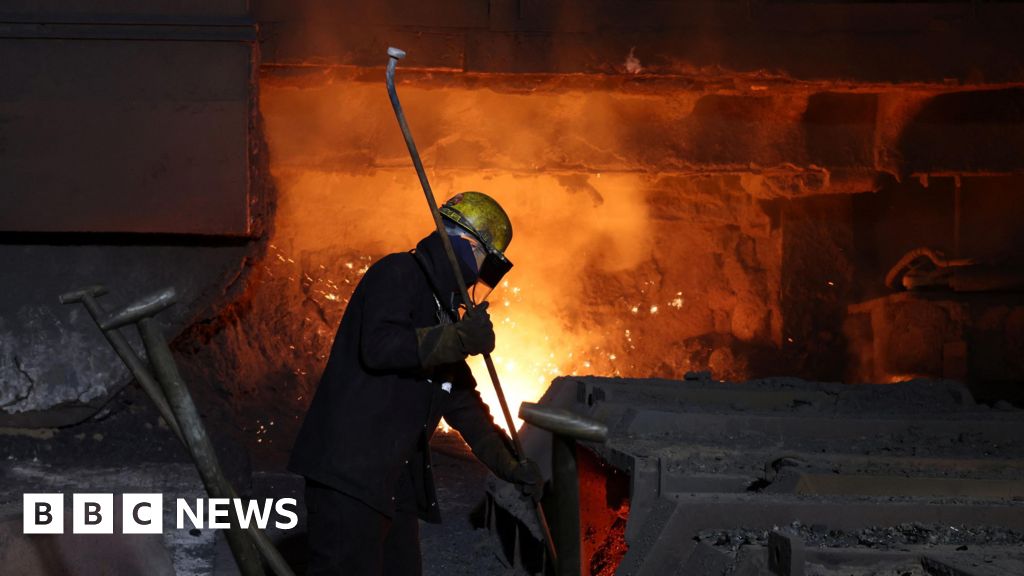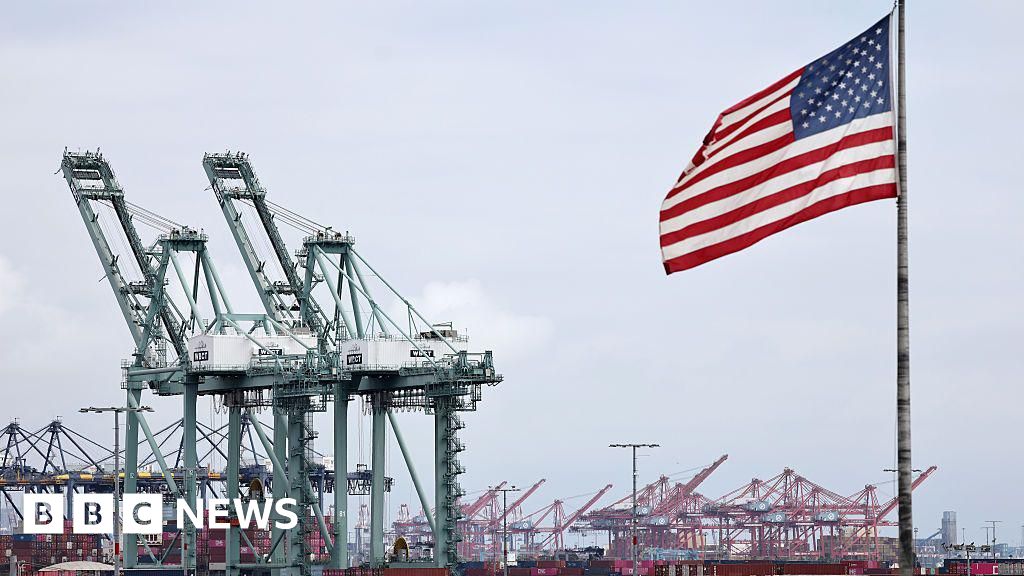Business
EU steel tariff hike threatens ‘biggest crisis’ for UK industry

The EU has announced plans to hike tariffs on imported steel in a move the UK’s steel industry has said could be “perhaps the biggest crisis” it has ever faced.
The commission has set out plans to cut the amount of steel that can be imported into the bloc by half – beyond which the new 50% tariffs will apply.
The EU is the UK’s most important export destination for steel, worth nearly £3bn and representing 78% of steel products made in the UK for overseas markets.
The commission has come under pressure from some member states and their steel industries, which have been struggling to compete with cheap imports from countries like China and Turkey.
The EU is proposing to reduce tariff-free quotas for imports to 18.3 million tonnes a year – a 47% reduction from 2024 levels.
The new measures will come into force early next year, but will first need to be approved by the majority of EU member states and the European Parliament.
“We have global over capacity, unfair competition, state aid, and undercutting in prices and we are reacting to that”, Stéphane Séjourné, the European Commission’s executive vice president for prosperity and industrial strategy.
“Eighteen thousand jobs were lost in the steel sector in 2024. That’s too many, and we had to put a stop to that”, he told a news conference at the European Parliament in Strasbourg.
The announcement is another blow to the UK steel industry, after a proposed deal to eliminate tariffs on UK steel exports to the US was put on hold indefinitely in September.
Several firms were already in dire financial straits.
The government took control of Chinese-owned plants in Scunthorpe earlier this year, while Liberty Steel plants in Rotherham and Stocksbridge collapsed into government control last month.
Speaking on his way to India on Tuesday, the prime minister said there would be “strong support” from the government for the British steel industry, which could be severely impacted by EU tariffs.
“I’ll be able to tell you more in due course, but we are in discussions as you’d expect”, Sir Keir Starmer said, refusing to go into the details of any discussion, including whether the UK was seeking exemptions from the rules.
Responding to the announcement, the director general of UK Steel, Gareth Stace, said the government “must go all out to leverage our trading relationship with the European Union to secure UK country quotas or potentially face disaster”.
The move by the European Union is partly a response to US President Donald Trump, who sharply raised tariffs on foreign steel earlier this year, citing concern about China and has pushed other countries to take similar steps.
Canada, Mexico and Brazil have also moved to increase protections for domestic steelmakers, responding to concerns about those firms losing business in the US while facing increased competition at home from shipments shifting from America.
Mr Stace cautioned now against the EU’s measures “redirecting millions of tonnes of steel towards the UK”, something which could be “terminal for many of our remaining steel companies”.
The Community Union, representing UK steelworkers, called the measures an “existential threat” to the industry.
Asked about UK concerns, European trade commissioner Maros Sefcovic said at a press conference that he expected to “fully engage” with the UK on this issue, suggesting that a specific UK quota might be negotiated in the future.
In a statement, the Department for Business said it was “pushing the European Commission for urgent clarification of the impact of this move on the UK”.
“It’s vital we protect trade flows between the UK and EU and we will work with our closest allies to address global challenges rather than adding to our industries’ woes”, Industry Minister Chris McDonald said.
“This government has shown its commitment to our steel industry by securing preferential access to the US market for our exporters, and we continue to explore stronger trade measures to protect UK steel producers from unfair behaviours.”
The government said the industry minister will meet steel representatives on Thursday to discuss their concerns.
Liam Bates is UK managing director at Marcegaglia in Sheffield, which makes stainless steel products and exports to the EU. He said the announcement was a “big blow”.
“It must be amongst the biggest challenges we’ve faced for a very long time. Now the big question is on the detail. Will there be any deal done by the UK government to soften the blow?”
“We have no tariffs on Europe themselves, so you would expect some reciprocity on that, so that we are not treated in the same way. That’s the detail we’re hoping the government should work towards”, he said.
In the meantime, he said future trade with EU customers is a concern.
“We have good relationships with our customers, and we will be communicating with them, but it puts a strain on our business immediately.”
“Our customers are in there for the long term, and so there will be a question over whether there’s a long-term relationship that can still be had in the face of these quotas.”
Business
Trump’s new global tariff comes into effect at 10%

The global levy comes in at 10%, lower than the rate the president had threatened at the weekend.
Source link
Business
How long will Jamie Dimon stay as JPMorgan CEO? Bank chief signals ‘few more years’ at the helm – The Times of India

JPMorgan Chase CEO Jamie Dimon signalled he plans to remain in charge of the largest US bank for “a few years,” offering fresh clarity on leadership succession even as the lender projected strong investment banking and trading performance, Reuters reported.Speaking at the bank’s Investor Day in New York, Dimon said he does not intend to step down immediately and may continue with the firm in a different role after eventually relinquishing the chief executive position.“I’m here for a few years as CEO, and maybe a few after that, as executive chairman, pending whatever the board wants to do,” Dimon said.His remarks come amid long-running investor speculation over succession planning at JPMorgan, where Dimon has led the bank for two decades. The lender’s board, he has previously said, remains focused on preparing a deep bench of executives capable of eventually taking over leadership.Under Dimon’s tenure, JPMorgan has risen to become Wall Street’s largest bank by both assets and market value, with a market capitalisation exceeding $800 billion — eclipsing the combined value of rivals Bank of America and Citigroup.Alongside leadership commentary, JPMorgan said it expects investment banking fees and markets revenue to post strong growth in the first quarter, easing concerns that recent equity market turbulence could disrupt dealmaking activity.Investor worries had grown after a sharp sell-off in software and technology stocks — driven by fears of artificial intelligence disruption — raised doubts about mergers and acquisitions and IPO pipelines for high-growth companies.Allaying those concerns, the bank said investment banking fees are expected to rise by a mid-teens percentage, potentially reaching the high teens in the quarter.“We started the year strong. Pipelines were very good, and it was broad based. The one thing I will say in M&A (is that) there are powerful strategic drivers,” Doug Petno, Co-CEO of JPMorgan’s commercial and investment bank, said. “I think a lot of these transactions will survive the volatility and carry on.”Markets revenue is also expected to increase by a mid-teens percentage, supported by elevated trading activity during volatile market conditions, when investors hedge risks and reposition portfolios.The bank kept its forecast for annual adjusted expenses unchanged at $105 billion as it continues investing heavily in technology and artificial intelligence initiatives.JPMorgan expects to spend $19.8 billion on technology in 2026, up 10% from a year earlier.“We continue to invest in AI and we’re seeing tangible benefits in multiple areas. Machine learning and analytical AI have been driving improvements in revenue,” Chief Financial Officer Jeremy Barnum said, as quoted Reuters.UBS analyst Erika Najarian said markets increasingly view large money-centre banks as relative beneficiaries of AI disruption, adding investors are keen to understand both productivity gains and revenue opportunities from the technology.Executives said US consumers remain resilient despite elevated interest rates and economic uncertainty, helping sustain spending and credit quality.JPMorgan executive Marianne Lake said the bank had not seen deterioration among lower-income consumers and that “everything is solid” on the consumer front.The lender is targeting a return on tangible common equity of 17%, a key profitability metric measuring how efficiently tangible equity generates profits.In January, JPMorgan reported fourth-quarter earnings that exceeded analysts’ estimates as volatile markets boosted trading income. The bank beat Wall Street profit forecasts in all four quarters last year, according to LSEG-compiled data.JPMorgan shares rose 34.4% in 2025, outperforming both large-cap US banking peers and the broader equity market, while the stock traded marginally higher in post-market activity.
Business
Spirit Airlines plans to slash flights, fleet in bid to emerge from bankruptcy as early as spring

A Spirit Airlines Airbus A320 taxis at Los Angeles International Airport after arriving from Boston on September 1, 2024 in Los Angeles, California.
Kevin Carter | Getty Images News | Getty Images
Spirit Airlines is gearing up to shrink to a tiny version of its former self in an attempt to survive, according to a new plan it unveiled in U.S. Bankruptcy Court on Tuesday.
The budget-travel icon said it will get rid of even more of its Airbus fleet as it plans to exit its second bankruptcy in less than a year. It expects to emerge in late spring or early summer, Spirit’s lawyer, Marshall Huebner of Davis Polk, said at a hearing.
The airline has reached an agreement in principle with its creditors for the plan, Huebner said, adding that secured lenders will make “material incremental liquidity available to Spirit via the release of cash collateral.”
In its second bankruptcy, Spirit had held deal talks with Frontier Airlines, and with investment firm Castlelake. Nothing materialized, but Huebner hinted a combination could be back on the table.
“This emergence will allow Spirit to do many things from a position of strength and stability, including to consider potential future industry transactions,” Huebner said.
Spirit’s new fleet would be made up of mostly older Airbus planes, “with the potential rejection of additional high cost NEO aircraft,” Huebner said, referring to the more modern Airbus A320 family of planes, adding that the exact size of Spirit’s fleet will depend on talks with counterparts like aircraft lessors.
He said Spirit’s annualized fleet cost would be cut another $550 million, down 65% from before its bankruptcy filing last year. The debtors have also eyed another $300 million in cost savings from non-fleet cuts, he said.
Spirit has already reduced some of its Airbus fleet and furloughed pilots and flight attendants to cut costs as it reduced its network, though some cabin crew members were called back to work ahead of spring break.
“Because every single day counts, and every single dollar counts, the airline industry is just as competitive today with this deal in hand as it was last Friday, and we must — and will — lock down what we need from other stakeholders and then begin a high speed march to get this storied company out of Chapter 11 at the earliest possible date so that it can write its next chapters from a position of strength,” Huebner said.
Spirit’s new plan will be challenging. It would pit a smaller version of Spirit against ever-larger competitors that dominate the U.S. market. Some U.S. budget carriers have struggled due to a surge in labor and other costs post-Covid, a growing consumer shift in favor of more upscale travel and increased competition from larger airlines that offer stripped down fares.
Spirit was uniquely challenged by a massive engine recall from Pratt & Whitney and a failed plan to get acquired by JetBlue Airways, a deal knocked down by a federal judge in early 2024.
Spirit forecast it would generate a net profit of $252 million last year, according to a court filing in December 2024. But it said in an August report that it lost nearly $257 million in a matter of months stretching from March 13, after it exited its first Chapter 11 bankruptcy, through the end of June. It filed for Chapter 11 bankruptcy protection again less than a month later.
-

 Entertainment1 week ago
Entertainment1 week agoQueen Camilla reveals her sister’s connection to Princess Diana
-

 Tech1 week ago
Tech1 week agoRakuten Mobile proposal selected for Jaxa space strategy | Computer Weekly
-

 Politics1 week ago
Politics1 week agoRamadan moon sighted in Saudi Arabia, other Gulf countries
-

 Entertainment1 week ago
Entertainment1 week agoRobert Duvall, known for his roles in "The Godfather" and "Apocalypse Now," dies at 95
-

 Business1 week ago
Business1 week agoTax Saving FD: This Simple Investment Can Help You Earn And Save More
-

 Politics1 week ago
Politics1 week agoTarique Rahman Takes Oath as Bangladesh’s Prime Minister Following Decisive BNP Triumph
-

 Tech1 week ago
Tech1 week agoBusinesses may be caught by government proposals to restrict VPN use | Computer Weekly
-

 Sports1 week ago
Sports1 week agoUsman Tariq backs Babar and Shaheen ahead of do-or-die Namibia clash





